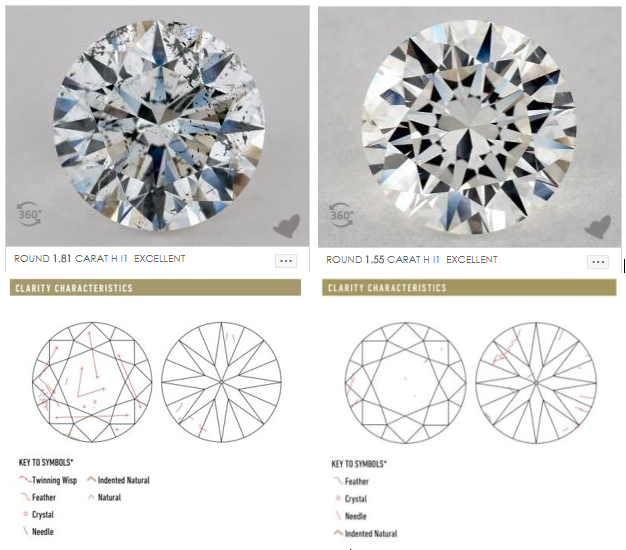January 28th 2022
What To Know About Diamond Clarity
By Devin Jones
What is Diamond Clarity?
Diamond clarity is a measure of how many imperfections exist within a diamond or on the diamond's surface. These imperfections, called inclusions, can range from minor to serious depending on their size, type, and location.
Diamond inclusions can look like anything from a little white speck inside the diamond that even a microscope may not detect to a fully cloudy or scratchy looking diamond. Below are images of two I1 clarity stones, both of H color. You can see that the stone on the right is clearly preferable to the stone on the left which appears “scratchy”. The price also reflects this fact, the stone on the right is .26 carats smaller but costs $110 more.

This “scratchiness” is created by a certain type of inclusion, known as a twinning wisp, as well as other inclusions like feathers, crystals, and needles, which are outlined on the GIA certificate of the stone on the left. Below the pictures of the diamonds are images taken from each diamond’s GIA certificate showing how the institute has labeled the different inclusions present in each stone. Better clarity diamonds will show far fewer inclusions (or even no inclusions) on their GIA certificate. You may also notice that the diamond on the right has fewer inclusions visible from the top of the stone and more inclusions visible from the bottom. For more advice check out our guide on how to read a GIA certificate.
Clarity is definitely an important consideration, but just like color it will only matter up to a certain point. That point is where an observer without a microscope will no longer be able to tell the difference. Diamonds are typically meant as a gift to be presented and shown off, so the visual appearance is what people generally care most about, not the technical aspects of the clarity. For example, buying a flawless diamond would cost significantly more than buying a VS2 version (which should still be flawless to the naked eye) so it is usually not advisable to buy a super high clarity stone. One should also not go too far down in clarity and risk a poorer quality that is visible to the naked eye.
The line where people begin to notice a visual difference is typically around the SI1 clarity grade (see chart below), so we typically advise you to look at VS2 or better clarity just to be safe. However, some SI1 clarity stones have less noticeable flaws and can cost significantly less than VS2 versions – so it really does come down to seeing images and videos of these stones. Here’s the clarity scale as shown on GIA.edu.

For starters, anything above VS1 clarity is overkill in terms of clarity – you shouldn’t pay up for it if all you care about is how the stone will look in an engagement ring setting. In fact, certain SI1 stones are indistinguishable from FL diamonds when viewed without a microscope. But, that doesn’t mean you shouldn’t buy a higher clarity stone.
Higher quality stones (FL, IF, VVS1, VVS2) are often underpriced because people are less inclined to buy them. For example, the most common clarity for a K color stone is SI2 whereas the most common clarity grade for D colored stones is VS1 (3 full grades higher. The reason is obvious, that people who are buying K color are more budget conscious, while the people willing to pay up for D color are pickier about what they choose.

StoneAlgo Recommendation
It’s all about the optics and the price. If you can find a great looking SI1 then it may be passable for a VS1 when placed in a setting – but the price will probably be higher than you’d typically pay for an SI1. We recommend you search for VS2 clarity or better since the quality varies greatly in the SI1 and lower range. Using StoneAlgo’s search algorithm you can easily see the best diamonds to consider within your target range (more on this in the final section).
